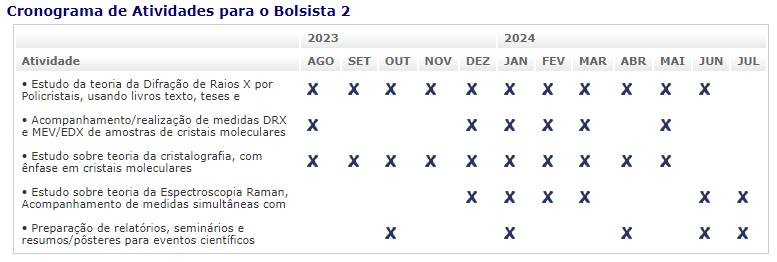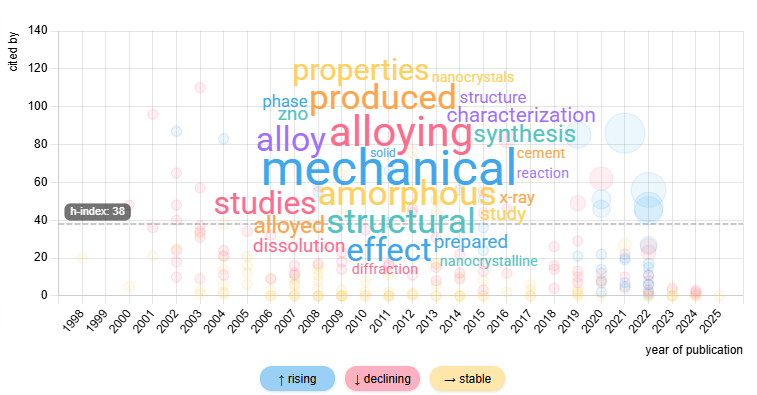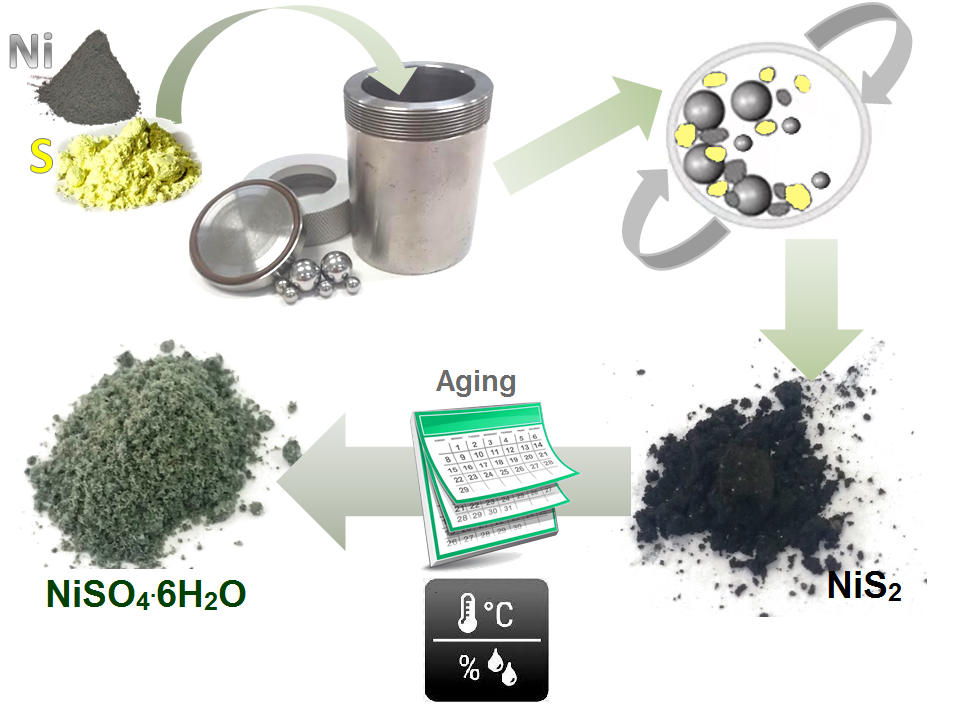📢 OPORTUNIDADE: UMA BOLSA PIBIC – BIÊNIO 2025-2026
O grupo de pesquisa em Síntese e Caracterização de nanoMateriais, vinculado ao Departamento de Física da UFSC, está com vagas abertas para bolsistas PIBIC para atuação nas seguintes instalações de pesquisa da UFSC: Laboratório de Síntese e Caracterização de nanoMateriais (LSCnM), Laboratório de Difração de Raios X (LDRX), Laboratório Central de Microscopia Eletrônica (LCME), Laboratório Multiusuário de Agro-Fotônica (LAMAF) e, eventualmente, Laboratório Multiusuário de Caracterização Magnética de Materiais (LabCAM).
Venha desenvolver suas habilidades experimentais com a gente. Vamos desvendar como o estudo da interação da radiação com a matéria permite entender como as técnicas físicas funcionam e como os resultados dos experimentos podem ajudar na caracterização das propriedades físico-químicas de materiais (inclusive os nanoestruturados) e na descrição dos fenômenos que ditam as possíveis aplicações tecnológicas dos mesmos.
🔍 ÁREA DO PROJETO:
Síntese e Caracterização de nanoMateriais
Para mais informações visite:
🗓 DURAÇÃO DA BOLSA:
Início imediato até o fim do ciclo atual (agosto de 2026).
💰 BENEFÍCIOS:
- Bolsa mensal CNPq no valor vigente (https://pibic.ufsc.br/editais_pibic/ );
- Participação ativa em projeto de pesquisa;
- Orientação direta de pesquisador com experiência na área;
- Possibilidade de apresentação de trabalhos em eventos científicos.
🎓 PRÉ-REQUISITOS:
- Estar regularmente matriculado em curso de graduação da UFSC;
- Ter CRA compatível com os critérios do PIBIC/CNPq;
- Não possuir vínculo empregatício nem outra bolsa de pesquisa;
- Interesse e comprometimento com a pesquisa científica.
📄 COMO SE CANDIDATAR:
Envie os seguintes documentos para carlos.campos@ufsc.br :
- Histórico escolar atualizado;
- Currículo Lattes;
- Grade de horários no semestre atual.
📌 Observações:
A seleção será realizada por análise de perfil acadêmico e entrevista, com início das atividades previsto para mês de maio.
📧 Dúvidas: Entre em contato pelo e-mail carlos.campos@ufsc.br.
📢 OPORTUNIDADE: DUAS BOLSAS PIBIC – BIÊNIO 2024-2025
O grupo de pesquisa em Síntese e Caracterização de nanoMateriais, vinculado ao Departamento de Física da UFSC, está com duas vagas abertas para bolsistas PIBIC para atuação nos últimos meses do biênio 2024-2025.
🔍 ÁREA DO PROJETO:
Síntese e Caracterização de nanoMateriais
Para mais informações visite:
🗓 DURAÇÃO DAS BOLSAS:
Início imediato até o fim do ciclo atual (agosto de 2025).
💰 BENEFÍCIOS:
- Bolsa mensal CNPq no valor vigente (https://pibic.ufsc.br/editais_pibic/ );
- Participação ativa em projeto de pesquisa;
- Orientação direta de pesquisador com experiência na área;
- Possibilidade de apresentação em eventos científicos.
🎓 PRÉ-REQUISITOS:
- Estar regularmente matriculado em curso de graduação da UFSC;
- Ser compatível com os critérios do PIBIC/CNPq (https://pibic.ufsc.br/editais_pibic/ );
- Não possuir vínculo empregatício nem outra bolsa de pesquisa;
- Interesse e comprometimento com a pesquisa científica.
📄 COMO SE CANDIDATAR:
Envie os seguintes documentos para carlos.campos@ufsc.br :
- Histórico escolar atualizado;
- Currículo Lattes;
- Grade de horários no semestre atual.
📌 Observações:
A seleção será realizada por análise de perfil acadêmico e entrevista, com início das atividades previsto para mês de maio.
📧 Dúvidas: Entre em contato pelo e-mail carlos.campos@ufsc.br.
On October 27, 2023, I presented a seminar in the GRADUATE PROGRAM IN PHYSICS entitled “Nanomaterials: Synthesis and Characterization at UFSC and in “Large Facilities” in Brazil and in the World” in which I outlined some of the perspectives for future work that, certainly, will require human resources at post-graduate level.
The recording of the seminar can be accessed via the YouTube link.
Summary:
In this presentation, I intend to show some of my motivations for developing research in Nanoscience and Nanotechnology. A brief introduction will be given to what nanomaterials are and how they fit into the description of functional materials. I will mention the main methods for synthesizing nanomaterials and will emphasize mechanochemical synthesis, which I have used in the NanoMaterial Synthesis and Characterization Laboratory (LSCnM) of the Department of Physics at UFSC since 2001. I will begin the description of nanomaterial characterization techniques by showing those available in UFSC. I will give a panoramic view of how large laboratories, known as “Large Facilities”, in Brazil and around the world, are important for a better understanding of the physicochemical properties of nanomaterials and how these are decisive in the development of new materials. The expectation is that at the end of the presentation, some students will feel motivated to get involved in research on the development and characterization of new nanomaterials with potential future applications in the areas of energy and sustainability. I hope to attract post-graduate students to work under my guidance on scientific projects involving “green” synthesis and characterization of nanocrystalline chalcogenides with applications in thermoelectricity, superconductivity, electroanalytic, catalysis, etc.
I believe that the opportunities for use and news about the large Brazilian laboratories (Sirius and RMB) may be of interest to the UFSC community involved in scientific research involving materials.
ISIS – Brazil Collaboration for Neutrons
Learn about the development and characterization of new materials with potential future applications in energy and sustainability!
When: 25 October, 14:00–15:00 (CET)
Where: at LINXS (Scheelevägen 19, Lund), with digital participation possibility (Zoom). https://www.linxs.se/events/2023/10/25/linxs-guest-seminar-carlos-campos
Title: Characterization and applications of mechanochemically synthesized Chalcogenide powders
Speaker: Prof Carlos Campos, Department of Physics at the Federal University of Santa Catarina (UFSC) in Brazil
ABSTRACT
The combination of several experimental techniques and the microstructural modeling including the volume-weighted diameter size, surface-weighted ’true’ crystallite size for an ellipsoidal domain shape as well as the Debye Function (DFA) overcome conventional methods of analysis (notably the Rietveld method) that fail to consider important information contained in diffuse scattering, typically of disordered and/or nanometric materials.
This seminar is devoted to showing some results on these modeling for the Fe56Te44 and CoxTe100-x (with x = 32, 34, and 40) samples. Moreover, a brief overview of novel electrochemical sensors based on carbon paste electrodes (CPE) will be delivered. For instance, (CPE)/Ni3-xTe2 applied for the simultaneous detection of the neurotransmitters dopamine (DA) and adrenaline (AD) in phosphate buffer solution (pH 7.0), a CPE/NiTe2 successfully applied to morin determination in high, medium, and low polyphenols content red wines such as Tannat, Cabernet Sauvignon, and Pinot Noir, as well as the γ-CoTe2 nanocrystals (γ-CoTe2/GCE) with outstanding sensing abilities for ferulic acid. All the Iron, Nickel, and Cobalt Telluride composites were prepared by mechanochemical route in just a few hours and carefully characterized by X-ray diffraction, calorimetry, transmission electron microscopy, Raman spectroscopy, and magnetometry techniques.
At the end of the presentation, a few perspectives of complementary characterization using neutrons and synchrotrons will be presented with a focus on thermoelectric materials.
Saíram as 2 bolsas PIBIC que eu havia solicitado para o ciclo 2023-24 com vigências de
01/09/2023 a 31/08/2024.
Interessada(o) em fazer parte do programa sob minha orientação?
No link http://pibic.propesq.ufsc.br/editais_pibic/ vcs podem acessar o Edital PIBIC 2023-2024, onde estão as regras de participação/candidatura pra receber as bolsas
Os títulos e cronogramas dos 2 planos de atividades que criei e que foram aprovados pela comissão de avaliação do PIBIC são:
Plano de Atividades do Bolsista 1: Iniciação à cristalografia voltada ao estudo nanomateriais

Plano de Atividades do Bolsista 2: Iniciação à cristalografia voltada ao estudo de cristais moleculares

Entrem em contato pelo email carlos.campos@ufsc.br para demonstrar seu interesse, agendar uma reunião na sala virtual para nos conhecermos, para eu explicar sobre os planos e como poderão conhecer a infra onde as atividades devem se desenrolar.
Tenho até o dia 29/08/2023 para indicar estudantes.
Veja os trabalhos apresentados no Seminário de Iniciação Científica (SIC) pelas(os) estudantes que participaram do PIBIC sob minha orientação nos últimos anos:
| Titulo |
Aluno |
Departamento |
Orientador |
Nota |
Nota |
Média |
Dear visitor,
I use this message to invite you to attend my public defense of the Performance Assessment Memorial (MAD) and Academic Activities Memorial (MAA) for promotion to the top of the Higher Teaching career – Class E of Career – Full Professor).
Date: 7/1/2022 (Friday), at 2pm.
Digital Platform: Conferênciaweb. https://conferenciaweb.rnp.br/webconf/defesa-do-maa-do-prof-carlos-eduardo-maduro-de-campos
Link: https://cfm.ufsc.br/2022/06/28/promocao-titular-da-carreira-do-magisterio-superior-prof-carlos-eduardo-maduro-de-campos-0107202-as-14h00m/
ORDINANCE No 49/CFM/2022 informs that the Evaluation Committee of the Performance Assessment Memorial (MAD) and the Academic Activities Memorial (MAA) will be composed of the Full Professors:
- Dr. Luiz Augusto dos Santos Madureira – UFSC (Presidente)
- Dr. Antonio Martins Figueiredo Neto – USP
- Dr. Dante Homero Mosca Junior – UFPR
- Dr. Paulo de Tarso Cavalcante Freire – UFC
- Dr. Bernardo Ruegger Almeida Neves – UFMG (Suplente)
Yours sincerely,
Projeto de Pesquisa visa dar os primeiros passos no uso de técnicas Físicas experimentais, tais como a Difração de Raios X de Policristais (DRXP), Espectroscopia Raman (ER), na caracterização das propriedades físicas de nanomateriais produzidos por mecanoquímica.
Veja as instalações multiusuário disponíveis para desenvolver as atividades nesse projeto: LSCnM, LDRX, LabCAM, LCME e até mesmo o LNLS/CNPEM. Cinco bolsistas de IC já foram realizar experimentos no antigo acelerador do LNLS (UVX, propostas aprovas para uso das linhas de luz DXAS, XDS, XDR1).
Gostou?
Envie uma mensagem para carlos.campos@ufsc.br com anexos: 1) seu histórico escolar UFSC e 2) Grade de horários no semestre atual
Review article in a high impact factor journal (Chemical Society Reviews) on the use of mechanochemical methods to study their reactivity in the production of organometallic nanoparticles cited 4 scientific articles with research done at LSCnM of the UFSC Department of Physics. PPGFSC students at UFSC were at the forefront of all publications. The review article compiles the recent literature on the use of mechanochemical methods in the production of nanoparticles to organometallics. Also, present an overview of mechanochemical reactivity that complements recent developments in organic synthesis and catalysis
“Mechanochemistry by grinding, grinding, extrusion or other types of mechanical shear and repair has new reactivity for a wide range of reactions not seen in traditional solution-based environments.”
Read the review article on integration by clicking here.

















